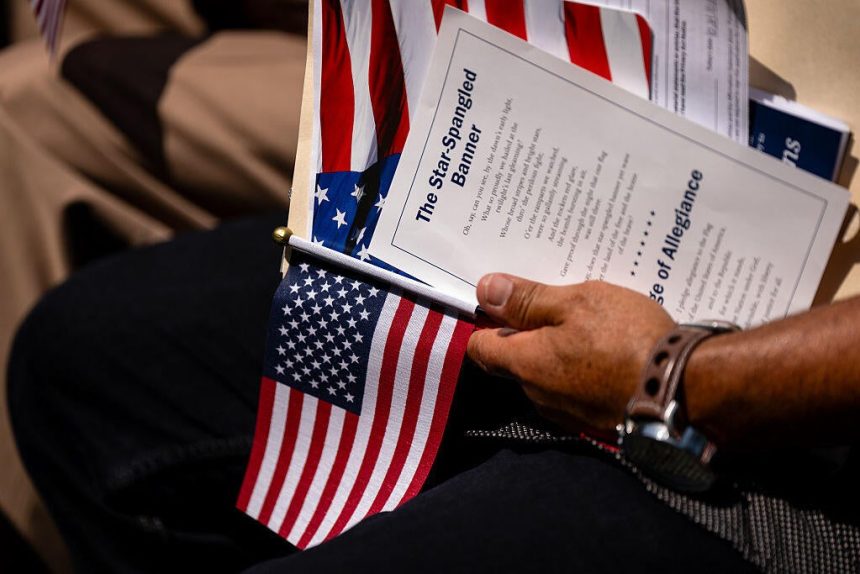The Trump administration is signaling it will more heavily scrutinize applications filed by legal immigrants seeking American citizenship, in its latest effort to tighten access to U.S. immigration benefits.
U.S. Citizenship and Immigration Services, the federal agency overseeing the country’s legal immigration system, instructed officers on Friday to consider additional factors when determining whether immigrants applying for U.S. citizenship have a “good moral character.”
Typically, legal immigrants with U.S. permanent residency, also known as a green card, can apply for naturalized American citizenship after a 3- or 5-year period, depending on their case. Demonstrating “a good moral character” has long been one of the requirements in U.S. immigration law for American citizenship, alongside passing English and civics tests.
For decades, under Republican and Democratic administrations, the “good moral character” assessment has generally been satisfied if applicants don’t have any of the criminal offenses or disqualifying conduct outlined in U.S. immigration law. Those disqualifying factors range from violent crimes like murder and aggravated felonies to drug offenses and being a “habitual drunkard.”
But a policy issued Friday by USCIS expands the “good moral character” assessment, saying that determination must involve “more than a cursory mechanical review focused on the absence of wrongdoing.” Instead, the review, the agency told its officers, should be “a holistic assessment of an alien’s behavior, adherence to societal norms, and positive contributions that affirmatively demonstrate good moral character.”
The directive orders officers to place a “greater emphasis” on applicants’ “positive attributes and contributions,” listing community involvement, family caregiving and ties, educational attainment, “stable and lawful” employment, the length of time spent in the U.S., and paying taxes as some of those factors.
The memo also mandates “greater scrutiny” of factors that show applicants lack a “good moral character,” beyond the crimes and disqualifying conduct detailed in U.S. immigration law.
Those factors, the policy said, include “acts that are contrary to the average behavior of citizens in the jurisdiction where aliens reside,” including actions that are “technically lawful” but also “inconsistent with civic responsibility within the community.” USCIS listed “reckless or habitual traffic infractions, or harassment or aggressive solicitation” as some of those actions.
Lastly, the new USCIS policy instructs officers to weigh factors that could show that applicants who have engaged in wrongdoing have rehabilitated, such as complying with probation, paying overdue taxes or child support and receiving letters of support from their community.
Over the past decade, the U.S. government has naturalized between 600,000 and 1 million immigrants as citizens annually, USCIS figures show.
In a statement to CBS News, USCIS chief spokesman Matthew Tragesser said the directive is another effort by President Trump’s administration to “restore integrity” to the U.S. immigration system.
“U.S. citizenship is the gold standard of citizenship — it should only be offered to the world’s best of the best,” Tragesser added. “Today, USCIS is adding a new element to the naturalization process that ensures America’s newest citizens not only embrace America’s culture, history, and language but who also demonstrate Good Moral Character.”
Doug Rand, a former senior USCIS official during the Biden administration, suggested the Trump administration’s policy is designed to scare legal immigrants from applying for American citizenship and require officers to put their “thumb on the scale” to find more reasons to deny applications.
“They’re trying to increase the grounds for denial of U.S. citizenship by kind of torturing the definition of good moral character to encompass extremely harmless behavior,” Rand said, citing the policy’s reference to traffic infractions.
While the Trump administration has launched a highly visible crackdown on illegal immigration by deploying thousands of troops to the southern border, expanding immigration raids across the country, and fast-tracking deportations of those in the U.S. illegally, it has simultaneously moved to restrict legal immigration, with less fanfare.
The Trump administration has virtually shut down refugee admissions, terminated Biden-era programs that allowed migrants to enter the U.S. legally, limited visas for certain countries and implemented aggressive vetting procedures for legal immigration benefits. Those efforts include expanded vetting of social media activity of legal immigrants and stricter screening requirements for some applications.
Saturday Sessions: Lord Huron performs “Nothing I Need”








